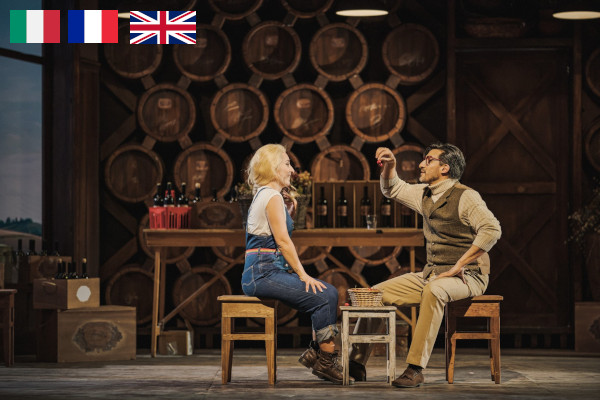Molto talento per nulla
di Susanne Krekel
Un dispiego di impegno, professionalità e talenti all'altezza della fama del Maggio Fiorentino non riesce a superare la fragilità intrinseca nell'Amico Fritz di Mascagni.
FIRENZE, 3 marzo 2022 - Si viene sempre al Teatro del Maggio con aspettative molto alte quanto alla qualità artistica degli spettacoli. Da questo punto di vista non siamo stati delusi. L'opera, per contro, è tanto sciocca quanto magniloquente: un giovanotto ricco e generoso che si dichiara scapolo per principio, vuole essere amico di tutto, scommette di non sposarsi, si trova prontamnete innamora e... si indovina il seguito. La musica è nondimento sentimentale e banale, pur con una certa aggressività, come se l'autore avesse voluto insistere da parte sua sulla porale patriarcale della storia.
Per fortuna, la produzione è piacevole e la compagnia e l'orchestra più che all'altezza.
Rosetta Cucchi ha trasferito l'azione degli USA degli anni '50, scelta affatto consona, visto che l'intreccio piuttosto piatto esprime i valori in voga in quell'epoca: amore, matrimonio (eterosessuale, s'intende), famiglia, tutto ciò che può piacere al buon Dio. Che di ciò sia un rabbino a farsi avvocato e non un prete cattolico è un elemento che avrebbe potuto arricchire il libretto di qualche riflessione, ma non se ne fa nulla.
Il primo e il terzo atto si svolgono in un classico drugstore, con il bancone, i tavolini rotondi, all'esterno si vedono facciate con scale antincendio; il poliziotto di ronda ha preso perfettamente l'allure da macho del piccolo uomo con un piccolo potere. Il posto è affollato, l'amico Fritz tiene la sua corte, circondato dai suoi amici, lo si vede aiutare una giovane coppia che deve sposarsi, si scopre che ha aiutato degli orfanelli gitani. È Teresa Iervolino nei panni di Beppe, il violinista gitano, a raccontare questa storia toccante, e pure lei è toccante, formidabile con una voce eccezionale di mezzosoprano dal timbro di bronzo, calda e potende, e un eccellente gioco attoriale, tale che la si sarebbe presa veramente per un uomo. Non c'è bisogno di presentare Charles Castronovo, che realizza un Fritz ammirevol, la cui voce radiosa si sposa perfettamente con quella sopranile argentina di Salomé Jicia quale Suzel. Il loro ‟duetto delle ciliegie” nel secondo atto è incantevole, anche per la recitazione, con spirito e leggerezza. Per il secondo atto siamo in un'azienda vinicola e ci si domanda di sfuggita come il paesaggo idilliaco e vagamente toscano si combini con l'ambientazione newyorkese del drugstore americano di prima. Idea graziosa, comunque, quella della "golf cart" con cui arrivano gli amici di Fritz, con pic nic e rabbino. È Massimo Cavaletti che incarna questo personaggio con molta partecipazione e gran presenza scenica benché il suo strumento vellutato paia talora forzato in acuto. Malgrado tutto il talento e la professionalità di questa bella compagnia, la loro azione resta in superfice, si sente la difficoltà nel riempire un testo vuoto e banale di vere emozioni. Riccardo Frizza alla testa dell'orchestra del Maggio Musicale, con i suoi ottimi solisti, non riesce a sua volta a dare qualche sostanza a una musica tutto sommato vacua.
Una serata interlocutoria, dunque, che ci lascia un poco perplessi con la riscoperta di un'opera che potremo fare a meno di rivedere.
Beaucoup de talent pour rien
par Susanne Krekel
FLORENCE, le 3 mars 2022 - L’on vient toujours au Teatro del Maggio avec des attentes assez élevés quant à la qualité artistique des spectacles. Et de ce côté-là, nous n’avons pas été pas déçus. L’opéra par contre est aussi niais que grandiloquent : un jeune homme riche et bienfaisant se déclare célibataire par principe, il veut être l’ami de tous, prend le pari de ne pas se marier, se découvre promptement amoureux et - on devine la suite. La musique est tout aussi sentimentale et banale, et aussi d’une certaine agressivité, comme si l’auteur voulait insister de son côté sur la morale patriarchale de l’histoire.
Heureusement la mise en scène est plaisante et la distribution et l’orchestre plus que à la hauteur.
Rosetta Cucchi a transféré l’action dans les USA des années 50, choix tout à fait adapté, vu que le plot plutôt plat prône les valeurs en vigueur à cette époque : amour, mariage (hétérosexuel s’entend), famille, tout cela pour plaire au bon Dieu. Que ce soit un rabbin qui s’en fait ici l’avocat et non un prêtre catholique est un élément qui aurait pu enrichir le livret de quelques réflexions, mais il n’en est rien.
L’acte I et III se déroulent donc dans un drugstore classique, avec son zinc, ses tables rondes, à l’extérieur on aperçoit des façades avec leurs échelles d’incendie; le policeman qui fait la ronde a pris parfaitement l’allure macho du petit homme avec un petit pouvoir. L’endroit est peuplé, l’ami Fritz tient sa cour, entouré de ses amis, et l’on le voit aider un jeune couple dans le besoin de se marier, on apprend comment il a nourri des orphelins gitans. C’est Teresa Iervolino dans le rôle de Beppe, le violoniste gitan, qui conte cette histoire touchante, et elle est touchante aussi, formidable avec une voix de mezzo-soprano exceptionnelle, au timbre de bronze, chaude et puissante, et un excellent jeu d’acteur, pour un peu on la prendrait vraiment pour un homme. On ne présente plus Charles Castronovo qui campe un Fritz admirable, et dont la voix radieuse se marie parfaitement avec le soprano argenté de Salomé Jicia dans le rôle de Suzel. Leur ‟duo des cerises” de l’acte II est enchanteur, ainsi que leur jeu d’acteurs, spirituel et léger. Pour l’acte II nous sommes dans un domaine viticole et l’on se demande en passant comment le paysage idyllique et vaguement toscan cadre avec l’ambiance New-Yorkais du drugstore américain d’avant. Jolie idée cependant que celle de la voiturette de golf avec laquelle arrivent les amis de Fritz, complet avec pique-nique et rabbin. C’est Massimo Cavaletti qui incarne ce personnage avec beaucoup d’entrain et une grande présence scénique bien que son baryton de velours semble parfois un peu forcé dans les aigus. Malgré tout le talent et le professionnalisme de cette belle distribution, leur jeu reste superficiel, on sent qu’ils ont du mal à remplir des textes creux et banaux de vraies émotions. Riccardo Frizza à la tête del Orchestre du Maggio Musicale, ainsi que les très bons solistes n’arrivent pas non plus à donner quelque substance à une musique somme toute creuse.
Une soirée mitigée donc, qui nous laisse quelque peu perplexes, et la découverte d’une œuvre qu’on évitera désormais.
Much talent for nothing
by Susanne Krekel
FLORENCE, March 3 2022 - One always comes to the Teatro del Maggio with high expectations as to the artistic quality of the show, and on this head we were not disappointed. The opera in itself, however, manages to be at both stupid and grandiloquent: a rich young man, generous and beneficient, declares that he is by principle a bachelor, he want’s to be everyone’s friend, so he takes a bet not to marry in a certain lapse of time, promptly finds out that he is in love and - well, one can guess the rest. The music is just as banal and sentimental, with a touch of aggression in fact, as if the author wanted to insist on the patriarchal moral of the story.
Fortunately, the staging is pleasant and the cast and orchestra more than up to the task.
Rosetta Cucchi has transferred the action to the 1950s United States, a logical choice, since the petty plot defends the values of that time : love, marriage (heterosexual of course), family, all this to please God. The fact that it’s a Rabbi who is the advocate of these principles and not a catholic priest could add some reflections to the libretto, but - no such luck…
Act I and III are taking place in a classic American drugstore, with its bar, some round tables, outside we can see the typical facades with their fire ladders; the policeman doing the rounds has adapted the pose of the little macho man with a little bit of power. The place is crowded, Fritz is holding his court, we see him help a poor young couple get married, we learn how he helped feed a group of starving orphan children. It’s Teresa Iervolino in the role of Beppe, a gypsy violinist, who tells this touching story, and she is also touching, formidable with an exceptional mezzo of a warm and strong bronze timbre, and her acting is fabulous, she might really be a young man. No need to present Charles Castronovo who plays Fritz admirably and his radiant voice goes perfectly with the silvery soprano of Salome Jicia in the role of Suzel. Their ‟cherry duet” is sung enchantingly, and as their spirited and light acting is a delight. Act II takes place in Fritz’ vineyard and we wonder fleetingly how the idyllic and vaguely Tuscan surrounding landscape goes together with the New York drugstore ambiance we saw before. It’s a nice idea however, the golf cart that brings Fritz’ friends, complete with picknick and rabbi. Massimo Cavaletti is playing this character with lots of drive and a huge stage presence, although his velvety barytone sounds a bit strained sometimes in the high notes. Despite all the talent and professionalism of the cast, their acting remains shallow, and we get the feeling that they don’t quite know how to fill the hollow text with genuine emotions. Likewise, Riccardo Frizza conducting the Orchestra of the Maggio Musicale and its very good soloists don’t manage to give some depth to the meaningless music.
An evening of mixed impressions this was, leaving us somewhat perplexed; the discovery of a work henceforth to avoid.



